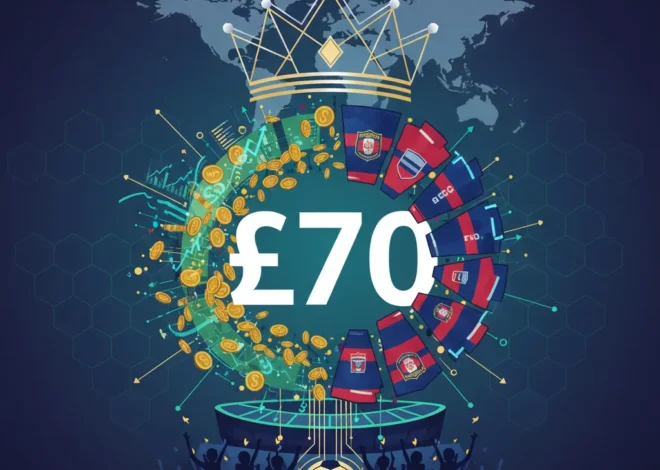
The Ultimate Trophy Asset: Why Wimbledon Debentures Are a Grand Slam for Investors
Every summer, the world turns its attention to the manicured lawns of SW19. The crack of the tennis ball, the pristine white attire, and the taste of strawberries and cream are hallmarks of The Championships, Wimbledon. For most, it’s a spectacular sporting event. But for a select group of individuals and corporations, it’s also the stage for one of the most unique and lucrative investments in the world of finance: the Wimbledon debenture.
Inspired by a letter to the Financial Times highlighting their remarkable value, this article delves deep into the world of Wimbledon debentures. We’ll explore what they are, why they have become such a coveted asset, and how they fit into the broader landscape of modern investing, from the traditional stock market to the cutting edge of financial technology.
What Exactly is a Wimbledon Debenture? Deconstructing a Unique Financial Instrument
In the conventional world of banking and finance, a debenture is essentially a type of loan or bond issued by a company to raise capital, often without any physical collateral. However, a Wimbledon debenture is a far more glamorous and complex instrument. Issued by The All England Lawn Tennis Ground plc, these debentures are the primary method used to fund major capital projects, such as the construction of new courts or the addition of retractable roofs.
Instead of just receiving interest payments, a debenture holder purchases a five-year package of unparalleled privileges. For the five-year term of the debenture, the holder receives:
- A prime, reserved seat for every day of The Championships on the corresponding court (Centre Court or No.1 Court).
- Access to exclusive debenture-holder restaurants, bars, and lounges with stunning views of the grounds.
- The right to sell their tickets for days they cannot attend on a year-by-year or day-by-day basis.
Crucially, the debenture itself is a tradable financial asset. Holders can sell their debenture on a secondary market at any point during its five-year life. This is where the true investing power lies, transforming a luxury experience into a serious component of a diversified portfolio.
The Financials: A Performance That Rivals the Stock Market
The allure of a debenture goes far beyond the champagne and prime seating. Financially, they have a track record that would make many fund managers envious. The All England Club periodically issues new series of debentures to fund its ongoing enhancements. The price of these new issues has steadily climbed, but the performance on the secondary market is even more telling.
Let’s look at the numbers. The 2021-2025 Centre Court debenture series was issued at a price of £80,000 each. According to Wimbledon’s official debenture marketplace, even in the latter years of their term, these have traded at prices significantly above their issue price, demonstrating robust demand. This capital appreciation is a key driver of their value. The most recent No.1 Court debenture series for 2022-2026 was issued at £46,000 (source).
To put their long-term performance in perspective, consider the following historical data comparison:
| Debenture Series (Centre Court) | Issue Year | Issue Price | Approx. Peak Market Value | Approximate Return |
|---|---|---|---|---|
| 2001-2005 | 1999 | £23,150 | £40,000+ | ~73% |
| 2006-2010 | 2004 | £27,750 | £60,000+ | ~116% |
| 2011-2015 | 2009 | £27,750 | £90,000+ | ~224% |
| 2016-2020 | 2014 | £50,000 | £120,000+ | ~140% |
Note: Market values are approximate and can fluctuate. Data synthesized from historical financial reports and market analysis.
Perhaps the most compelling financial aspect, particularly for UK-based investors, is their tax treatment. Under current UK legislation, any profit made from the sale of a Wimbledon debenture is exempt from Capital Gains Tax, as they are classified as “qualifying corporate bonds.” This is a significant advantage over most other forms of investing where profits are subject to taxation, immediately boosting the net return on investment (source).
The Teutonic Blunder: Are Germany's Auto Giants Ignoring Consumers at Their Peril?
A Trophy Asset in a Modern Portfolio
Wimbledon debentures are a prime example of a “passion” or “trophy” asset, a category of alternative investments that includes fine art, classic cars, rare watches, and fine wine. These assets often have a low correlation with the traditional stock market, making them an excellent tool for portfolio diversification, especially during times of economic uncertainty.
When the global economy faces headwinds or stock markets are volatile, tangible assets with intrinsic value and cultural significance often hold their ground or even appreciate. The global appeal of Wimbledon, combined with the strictly limited supply of debentures, creates a powerful economic moat that insulates them from the daily fluctuations of mainstream trading.
Here’s a simplified comparison of how a Wimbledon debenture stacks up against more conventional investments:
| Attribute | Wimbledon Debenture | S&P 500 ETF | Corporate Bond |
|---|---|---|---|
| Asset Type | Alternative, Hybrid (Financial/Experiential) | Equity | Debt |
| Liquidity | Low (Niche secondary market) | High (Daily trading) | Moderate to High |
| Primary Return | Capital Appreciation & Perks | Capital Appreciation & Dividends | Interest (Coupon) Payments |
| Risk Profile | Moderate (Tied to a single brand’s prestige) | High (Market volatility) | Low to Moderate (Credit risk) |
| Intangible Value | Extremely High (Prestige, access) | Low | Low |
Chile at a Crossroads: How a Political Shockwave Could Reshape Its Economy and Markets
The Economics of Engineered Scarcity
The enduring success of Wimbledon debentures is a textbook case study in the economics of scarcity. The All England Club issues only a limited number of debentures for each court—typically around 2,500 for Centre Court and 1,250 for No.1 Court. This fixed supply, set against a backdrop of growing global wealth and demand for unique experiences, creates the perfect conditions for price appreciation.
This asset class exhibits characteristics of a “Veblen good,” an economic concept where demand for a product increases as its price rises, because the higher price confers greater status. Owning a Wimbledon debenture is not just an investment; it’s a statement. It signals membership in an exclusive club, providing a level of access and prestige that money alone cannot always buy through normal channels. This psychological and social return is a powerful, unquantifiable part of the debenture’s overall value proposition.
The Deceleration Doctrine: Why Slowing Down is the New Strategy for Financial Success
Conclusion: Game, Set, and Match for the Discerning Investor
The Wimbledon debenture is a fascinating hybrid: a financial instrument born from a sporting institution, an investment that pays dividends in both capital gains and priceless memories. It expertly blends the worlds of finance, luxury, and sport, offering a unique proposition that stands apart from the digital noise of the stock market.
For high-net-worth individuals, family offices, and corporations seeking to diversify their holdings with assets that are not tied to the whims of the broader economy, the debenture offers a compelling case. It is a testament to the enduring power of brand, scarcity, and the human desire for exclusive experiences. While not an investment for everyone due to its high barrier to entry and low liquidity, for those who can play the game, owning a Wimbledon debenture is truly game, set, and match.


